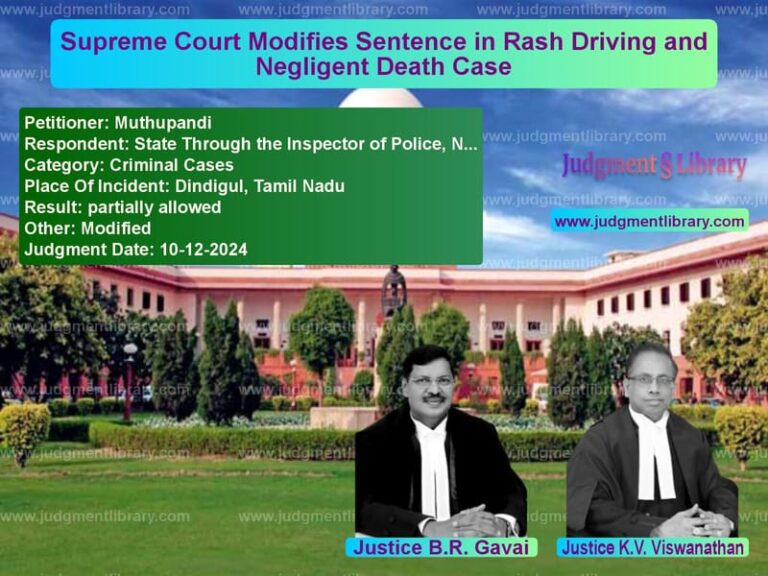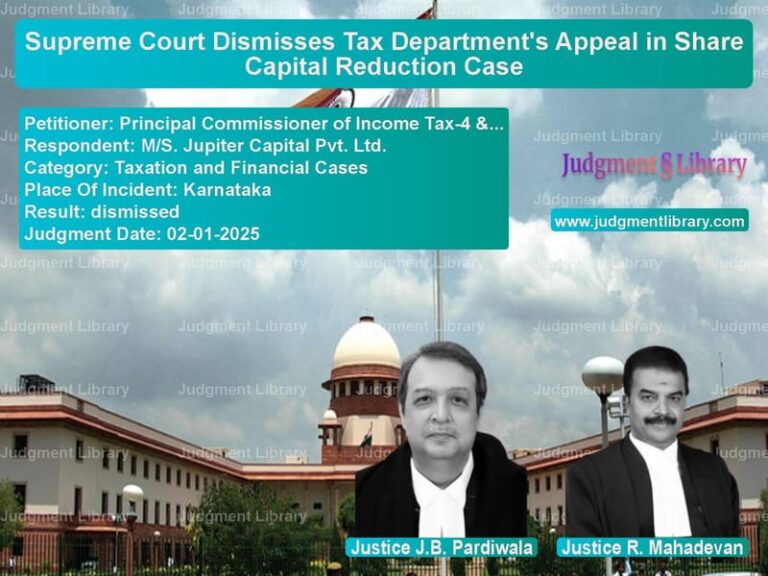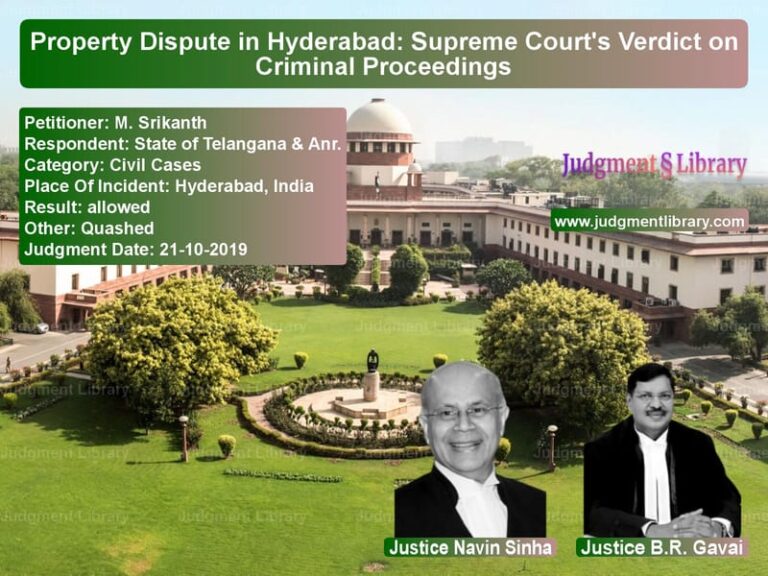Married Daughters’ Right to Inherit Leasehold Property: Supreme Court’s Ruling
The case of Uma Mahesh Bandekar & Anr. vs. Vivek Sadanand Marathe & Ors. is a landmark judgment addressing the inheritance rights of married daughters in leasehold property under the Goa Succession, Special Notaries, and Inventory Proceeding Act, 2012. The Supreme Court of India, in its judgment dated March 13, 2019, ruled that a married daughter has the right to inherit leasehold property, overturning earlier decisions that excluded her from succession.
The case arose from an inheritance dispute in Goa, where the respondents denied the petitioner’s right to claim a share in a leasehold commercial property. The key legal issue was whether a married daughter could inherit leasehold property under Goan succession law. The Supreme Court ruled in favor of the appellant, emphasizing that marital status cannot be a ground for exclusion from inheritance.
Background of the Case
The dispute involved a leased commercial property in Margao, Goa, which was part of a family estate inherited by siblings. The original tenant, Sadanand V. Marathe, and his wife, Nirmalabai S. Marathe, passed away in 1985 and 1998, respectively. Their children, including the petitioner Uma Mahesh Bandekar, claimed a right in the leased property.
Key facts:
- The leasehold property was part of the estate left behind by the deceased parents.
- The petitioner’s brother, Vivek Sadanand Marathe, initiated inventory proceedings in 2013 to distribute the estate.
- The inventory court excluded the leased premises from the list of assets, arguing that married daughters had no right to inherit leasehold property under the Goa Rent Act.
- The High Court upheld this exclusion, leading to an appeal before the Supreme Court.
Legal Issues Raised
- Does a married daughter have a right to inherit leasehold property under Goan succession law?
- Does the Goa Rent Act override inheritance rights provided under the Goa Succession, Special Notaries, and Inventory Proceeding Act, 2012?
- Should inventory proceedings recognize leasehold properties as part of the deceased’s estate?
Arguments by the Petitioner (Uma Mahesh Bandekar)
The petitioner argued:
- That under the Goa Succession, Special Notaries, and Inventory Proceeding Act, 2012, all legal heirs, including married daughters, have an equal right to inheritance.
- The leasehold property was part of the estate and should have been included in the inventory.
- The Goa Rent Act is irrelevant to inheritance disputes and applies only to landlord-tenant relations.
- Marital status cannot be a valid ground to deny succession rights.
Arguments by the Respondent (Vivek Sadanand Marathe & Ors.)
The respondents contended:
- That Section 2(o) of the Goa Rent Act defines tenants in a way that excludes married daughters.
- Since tenancy rights are personal and non-transferable, the leasehold property cannot be inherited.
- The Inventory Court was correct in excluding the leasehold premises from the inheritance list.
- Once the final partition order was accepted, the appeal was infructuous.
Supreme Court’s Judgment
The Supreme Court set aside the High Court’s ruling and held that married daughters have a right to inherit leasehold property under Goan law.
The Court ruled:
“There is no classification between a daughter (married or unmarried) and a son under the Goa Succession, Special Notaries, and Inventory Proceeding Act, 2012. A married daughter has an equal right to inherit leasehold property.”
The Court provided the following key findings:
- The Goa Rent Act does not govern inheritance. It only applies to landlord-tenant disputes, and it cannot be used to restrict succession rights.
- Leasehold rights are inheritable and must be included in inventory proceedings.
- Married daughters cannot be excluded from inheritance solely based on their marital status.
- The Supreme Court directed that the final inventory partition order be amended to include the leased premises as part of the estate.
Key Takeaways from the Judgment
- Inheritance laws must be gender-neutral. Married daughters have the same inheritance rights as sons.
- The Goa Rent Act does not override succession laws. It governs landlord-tenant relationships, not family inheritance.
- Leasehold properties are part of a deceased’s estate and should be included in inventory proceedings.
- Courts must ensure that inheritance rights are protected and not restricted by technical interpretations of tenancy laws.
Conclusion
The Supreme Court’s ruling in Uma Mahesh Bandekar vs. Vivek Sadanand Marathe is a significant step in securing inheritance rights for married daughters. It ensures that leasehold property is treated as part of the family estate and clarifies that succession laws override tenancy laws in matters of inheritance.
The judgment strengthens gender equality in property rights and sets a crucial precedent for similar cases in Goa and other regions where tenancy laws have been misinterpreted to deny women’s inheritance rights.
Petitioner Name: Uma Mahesh Bandekar & Anr..Respondent Name: Vivek Sadanand Marathe & Ors..Judgment By: Justice L. Nageswara Rao, Justice M.R. Shah.Place Of Incident: Margao, Goa.Judgment Date: 13-03-2019.
Don’t miss out on the full details! Download the complete judgment in PDF format below and gain valuable insights instantly!
Download Judgment: Uma Mahesh Bandekar vs Vivek Sadanand Marat Supreme Court of India Judgment Dated 13-03-2019.pdf
Direct Downlaod Judgment: Direct downlaod this Judgment
See all petitions in Property Disputes
See all petitions in Succession and Wills
See all petitions in Judgment by L. Nageswara Rao
See all petitions in Judgment by Mukeshkumar Rasikbhai Shah
See all petitions in allowed
See all petitions in Modified
See all petitions in supreme court of India judgments March 2019
See all petitions in 2019 judgments
See all posts in Civil Cases Category
See all allowed petitions in Civil Cases Category
See all Dismissed petitions in Civil Cases Category
See all partially allowed petitions in Civil Cases Category







